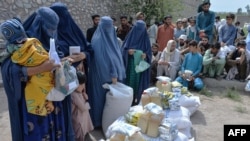The Muslim holy month of Ramadan — a time when Muslims abstain from food, drink, smoking and other activities from dusk to dawn daily, begins at sundown Saturday in most parts of the world
At sunset, Muslims break the daily fast with the iftar, a meal shared with family and friends.
Ramadan is the ninth month of the lunar Islamic calendar, and start and end dates vary each year. According to conventional Islamic belief, the Quran, the Muslim holy book, was first revealed to the Prophet Muhammad more than 1,400 years ago during Ramadan.
Fasting, one of the five pillars of Islam, is practiced by Muslims to achieve a greater consciousness of God. The other pillars include praying, giving alms, professing one's faith and going on a pilgrimage to Mecca, called the hajj.
This year will be the largest hajj since global coronavirus pandemic restrictions were enacted two years ago.
The Islamic Networks Group, based in San Jose, California, describes Ramadan as "a month of intense spiritual rejuvenation with a heightened focus on devotion, during which Muslims spend extra time reading the Quran and performing special prayers,"
Last year, fasting across the world ranged from 10 to 20 hours a day. In many majority-Muslim countries, working hours are reduced and restaurants close during fasting hours.
Ramadan ends at sundown on May 1.





